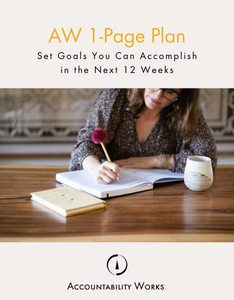A Desire to Streamline Decision Making
I bet you never thought of spring cleaning this…the number of decisions you are making in a day. Decision making, when it’s excessive, can lead to decision fatigue, which means we get tired and start making decisions based on what’s easiest, status quo or not making a decision at all. We don’t want that.
Marissa and I decided to streamline our systems to increase our capacity to take on new clients. We realized that we had to cut down on the number of decision points in our process and automate as much as possible without losing our signature personal touch.
Where can you simplify?
This approach inspired me to look at other places I could remove unnecessary decisions to maximize my time. I expected simplification what I didn’t expect was the amount of time I was wasting making unimportant decisions and how that was impacting my performance in other areas. It got me curious about decision fatigue because although I hadn’t realized I was experiencing it, now that I’m routinizing more of my day, I can see that I was.
In researching decision fatigue, I found that making a lot of decisions does make us tired but it makes us tired in a specific way. It depletes the part of our brain that is responsible for self-control. The more decisions we make the less self-control we have. That’s important because high levels of self-control are correlated to higher income, better health, lower rates of divorce, and higher achievement in school.
Decision Fatigue
Decision fatigue also shows up in the kinds of decisions we make. When faced with many decisions, regardless of whether they are difficult or not, our decision making ability goes down. We tend to either put off making a decision, make the decision that easiest in the moment, or make decisions with less consideration.
As an accountability coach, I find this particularly interesting when it comes to keeping commitments. When someone misses a commitment I take them back to the moment of decision. It takes willpower to overcome the resistance necessary to keep a commitment and brain wise it takes less resources to decide not to do something than to do something. So when depleted our fall back position is inaction. Knowing this you can do simple things to set yourself up to do what you say you are going to do.
Get adequate nourishment.
Interestingly, our brain runs primarily on glucose and although it’s only 2% of our body mass it consumes 20% of our calories. When the area of our brain responsible for making decisions or exerting self-control is depleted we crave glucose, i.e. sugar, to restore it. How you consume it is key so although you might want a quick fix make sure that what you are putting in your body is “smart” food because it’s literally feeding your brain.
Save your mornings.
Study after study have shown that your self-control, i.e. willpower, is at its peak in the mornings. The amount of decisions you have to make are going to increase no matter what throughout the day so cut down the number of decisions you make in the morning.
Twyla Tharp, choreographer and author of The Creative Habit, gets up every morning puts on her workout clothes and works out at the same gym for 2 hours. She’s 77.
Arianna Huffington wakes up and has hot water with lemon and does meditation and exercise. Then she showers, gets ready and has two cappuccinos from the same coffee shop.
And I’m sure many of you reading this make the same smoothie for breakfast everyday, start everyday with gratitude, or exercise first thing in the morning. (I know because we hold you accountable.) However, you might not realize that creating these routines is helping you make better decisions throughout the day.
Make your biggest most important decisions in the morning.
A study done on the world’s elite chess players, controlling for age, gender, and nationality, showed that they all made better decisions in the morning. Regardless of whether they considered themselves to be “a morning person” or “an evening person.”
Create buffers.
One study conducted by the lead social psychologist in the field and co-author of the book Willpower: Rediscovering the Greatest Human Strength, Dr. Roy Baumeister, showed that the average person spends 3-4 hours a day resisting desires. The most popular form of avoiding temptation? Distraction. That means that as we tire of resisting temptation we turn to distraction which further inhibits are ability to make good decisions.
Buffer 1: Get enough sleep. One of the top two biggest things we are resisting on a daily basis is the desire to sleep. When you get a good night’s rest you have one less thing you have to tax your willpower with.
Buffer 2: Stay satiated. The second biggest temptation is food. If you don’t want to eat it, don’t have it your house. Not only is it tempting it’s inhibiting your ability to make other good decisions.
Buffer 3: Smart distractions. When you need a break consider what kind of break you are taking. For instance, one of the biggest saps on your decision making ability is shopping. So when you find yourself on Amazon mid-afternoon or clicking on a link in your email from your favorite store – you are literally depleting your will power and ability to make good decisions. Instead when you need a distraction consider a walk outside, laying down for a couple of minutes, or having some brain food.
Make it a game.
Find ways to make cutting out decisions fun. Ask yourself, how many choices can I eliminate today? Just asking myself that question prompted me to remove several products from my bathroom, choose two items to have on hand for my breakfast, and consider my clothes and how I choose them differently. When I think of it as a game I’m playing there is no pressure to get it right. Every time I find a way to cut out a decision there is simply a feeling of satisfaction and space.
So think about your typical day, how can you eliminate at least one unimportant decision that you make every day?



